
Window Treatment Types
FAUX WOOD BLINDS
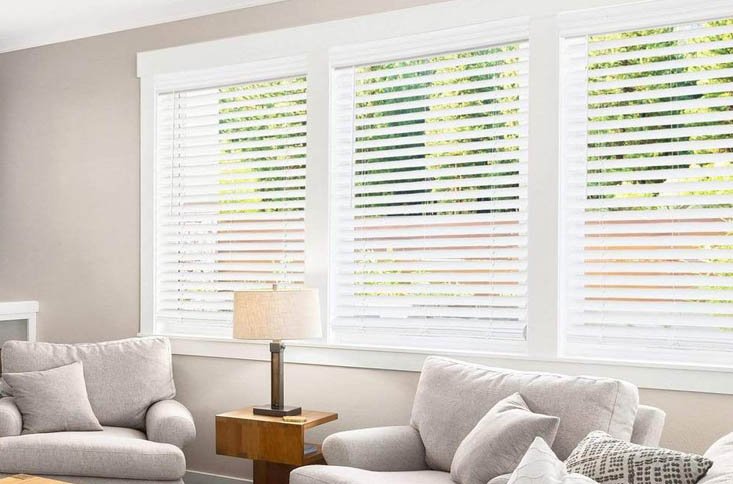
Faux wood blinds are window blinds designed to resemble real wood blinds but are crafted from man-made materials. They offer a cost-effective and practical alternative to genuine wood blinds, providing similar aesthetics with additional benefits.
Here's a breakdown of the key characteristics of faux wood blinds:
- Materials: Primarily made from composite PVC (polyvinyl chloride) or vinyl, offering a durable and moisture-resistant construction. This makes them ideal for high-humidity areas like kitchens and bathrooms, where real wood blinds can warp or crack due to moisture exposure.
- Appearance: Mimic the look of real wood blinds with realistic wood grain patterns and various color options, allowing them to seamlessly blend into different design styles.
Benefits:
- Cost-effective: Generally more affordable compared to real wood blinds.
- Durability: Resistant to warping, cracking, fading, and moisture damage, ensuring long-lasting functionality.
- Easy maintenance: Simple to clean with a damp cloth or duster, requiring minimal upkeep.
- Versatility: Available in a wide range of colors, styles, and slat sizes to suit diverse window sizes and design preferences.
- Light control: Offer similar light control capabilities as real wood blinds, allowing you to adjust the tilt of the slats to manage light filtration and privacy.
NATURAL WOOD BLINDS
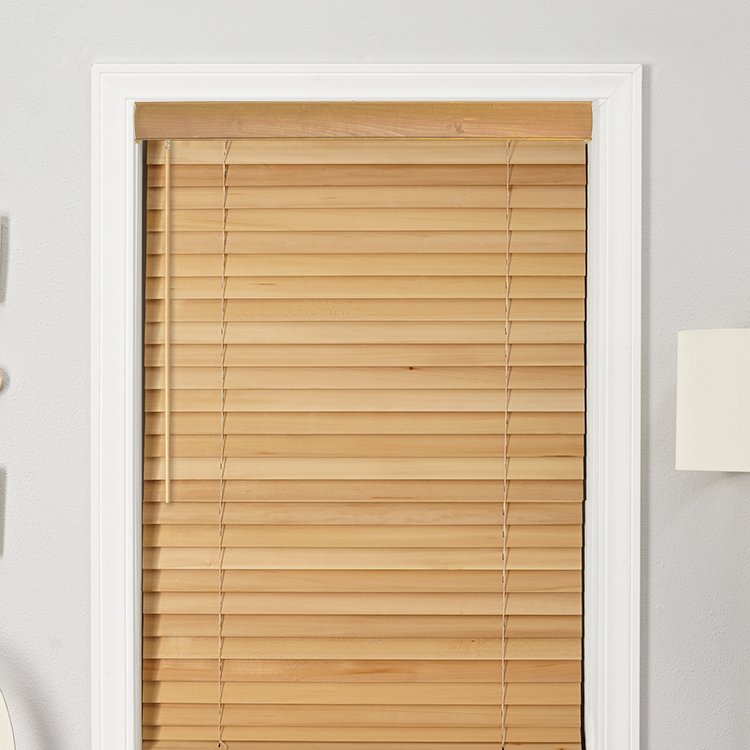
Natural wood blinds are elegant and timeless window coverings that infuse any space with the warmth and rich texture of real wood. They are a classic choice for those who appreciate the beauty and organic feel of natural materials in their home decor.
Here's a breakdown of the key characteristics of natural wood blinds:
- Materials: Constructed from real wood, such as basswood, pine, or maple, which provides an authentic and organic appeal. Each blind showcases the unique grain and texture of the wood, offering a distinct and sophisticated look.
- Appearance: They exude an elegance that only natural wood can offer, with each slat displaying its own unique grain and color. Available in a range of stains and finishes, natural wood blinds can be tailored to complement a variety of interior designs and color schemes.
Benefits:
- Aesthetic Quality: The natural beauty of wood adds a level of sophistication and warmth to any room, enhancing the overall décor with its rich textures.
- Customization: Available in various slat sizes, stains, and finishes, natural wood blinds can be customized to suit different aesthetic preferences and design needs.
- Insulation: Wood’s natural insulating properties help in maintaining indoor temperature, contributing to energy efficiency by keeping rooms warmer in winter and cooler in summer.
- Durability: With proper care, natural wood blinds are long-lasting and can maintain their beauty for years, making them a worthwhile investment for many homeowners.
- Light control: Like their faux wood counterparts, natural wood blinds offer excellent light control, with adjustable slats that provide varying levels of privacy and light filtration.
Considerations:
- Cost: Generally more expensive than faux wood blinds due to the use of real wood, which reflects in their quality and aesthetic appeal.
- Maintenance: More susceptible to environmental factors like humidity and temperature; they require regular maintenance to preserve their appearance and prevent warping or fading.
- Eco-friendliness: Opting for blinds made from sustainably sourced wood can be a more environmentally responsible choice.
ROLLER SHADES
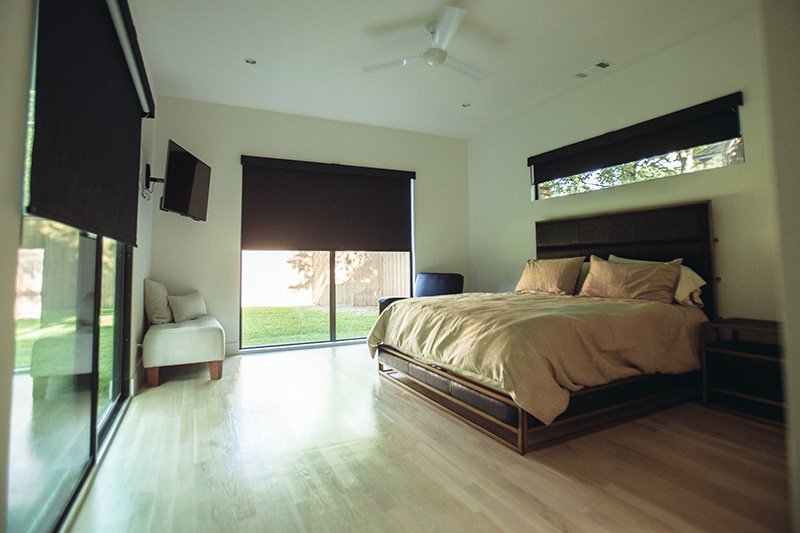
Roller shades are a type of window treatment consisting of a single piece of fabric that rolls up onto a cylindrical tube at the top of the window. They are a popular choice for windows due to their simplicity, versatility, and ease of use.
Roller shades come in a wide variety of materials, including:
- Fabric: This is the most common type of roller shade, and it is available in a wide range of colors, patterns, and textures.
- Vinyl: Vinyl roller shades are a good choice for high-moisture areas, such as bathrooms and kitchens, because they are easy to clean and moisture-resistant.
- Solar screen: Solar screen roller shades are made from a mesh fabric that helps to block out harmful UV rays and heat while still allowing some light to pass through.
HONEYCOMB SHADES

Honeycomb shades, also known as cellular shades, are a type of window treatment named for their unique honeycomb-shaped cell construction. These cells are made from fabric and trap air, offering several benefits for your home.
Benefits:
- Insulation: The trapped air in the cells acts as a barrier, helping to insulate your home and improve energy efficiency. This can keep your home cooler in the summer and warmer in the winter, potentially leading to lower energy bills.
- Light control: Honeycomb shades come in a variety of fabric opacities, ranging from sheer to blackout, allowing you to control the amount of light entering the room.
- Privacy: When lowered, honeycomb shades provide complete privacy, blocking the view into your home.
- Noise reduction: The air pockets within the cells can help to absorb sound, reducing noise pollution from outside.
- Style: Honeycomb shades offer a clean and modern look that can complement various design styles. They come in a wide range of colors, fabrics, and textures to suit your preferences.
WOVEN WOOD SHADES
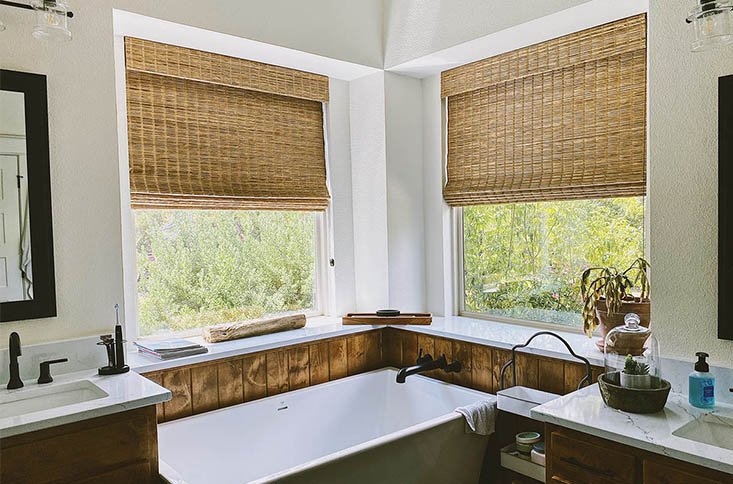
Woven wood shades, also commonly referred to as bamboo shades, are window treatments crafted from natural materials like bamboo, reeds, grasses, jute, and sisal. These materials are woven together to create a unique and stylish window covering that adds warmth, texture, and a touch of nature to any room.
Here are some of the key characteristics and benefits of woven wood shades:
- Natural materials: As mentioned earlier, they are made from natural, renewable resources, making them an eco-friendly choice for window treatments.
- Light filtering and privacy: Woven wood shades typically offer light filtering properties, gently diffusing sunlight while still allowing some light to pass through. However, the level of light control can vary depending on the weave density of the material. Thicker weaves will provide more privacy and room darkening.
- Aesthetics: They add a natural, organic element to a space and complement various design styles, from rustic and bohemian to coastal and contemporary.
- Durability: When properly cared for, woven wood shades can last for many years. Natural fibers like bamboo are known for their inherent strength and durability.
- Customization: Woven wood shades come in a variety of colors, textures, and weave patterns, allowing for customization to match your taste and décor. Additionally, some providers offer options for liners, motorization, and valances to further enhance functionality and style.
ROMAN SHADES
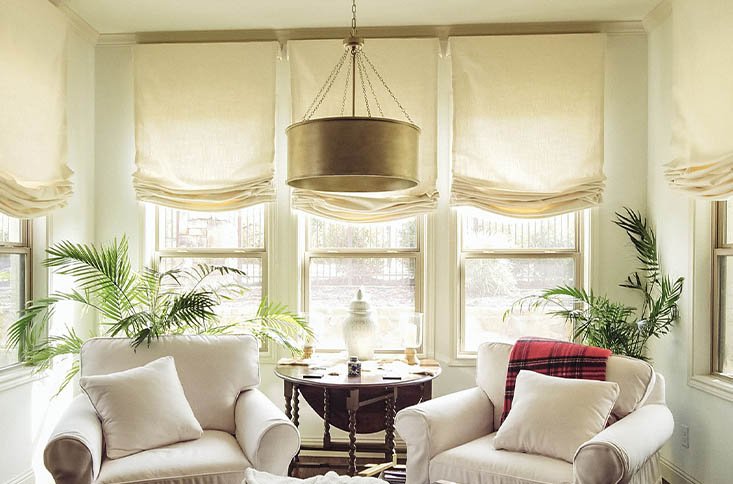
Roman shades are a type of window treatment made of fabric panels that stack up in neat horizontal folds when raised, and hang flat against the window when lowered. They offer a combination of the beauty and softness of drapery with the functionality and light control of blinds.
Here are some key characteristics of Roman shades:
- Fabric construction: They are typically made from various fabrics like cotton, linen, polyester, or even woven wood. The fabric choice influences factors like light control, privacy, insulation, and overall style.
- Folding mechanism: Roman shades have a series of horizontal rods sewn into the back of the fabric, creating even folds when raised using a pull cord or motorized system.
- Light control: Depending on the fabric opacity, they can provide light filtering, room darkening, or even blackout capabilities.
- Privacy: Roman shades offer complete privacy when lowered.
- Versatility: They come in a wide range of colors, patterns, and textures, making them suitable for various design styles and rooms.
- Benefits: Roman shades offer several advantages, including ease of operation, clean lines, and the ability to add a touch of softness and elegance to a space.
SHEER SHADES

Sheer shades are a window treatment that combines the benefits of blinds and shades. They consist of two layers of sheer fabric with horizontal or vertical vanes running between them .
The vanes can be tilted open or closed, allowing you to control the amount of light that enters the room. When the vanes are closed, they provide privacy and light filtering, similar to blinds. When the vanes are open, they diffuse the light softly, creating a gentle glow in the room, similar to sheer curtains.
Sheer shades are a popular choice for homeowners who want the following:
- Light control: You can adjust the amount of light entering the room by tilting the vanes.
- Privacy: When closed, sheer shades provide privacy from outside views.
- Soft light diffusion: Sheer shades diffuse harsh sunlight, creating a more comfortable atmosphere in the room.
- UV protection: Many sheer shades offer UV protection, which can help to protect your furniture and floors from fading.
- Style: Sheer shades come in a variety of fabrics and colors to complement any décor.
EXTERIOR PATIO SHADES
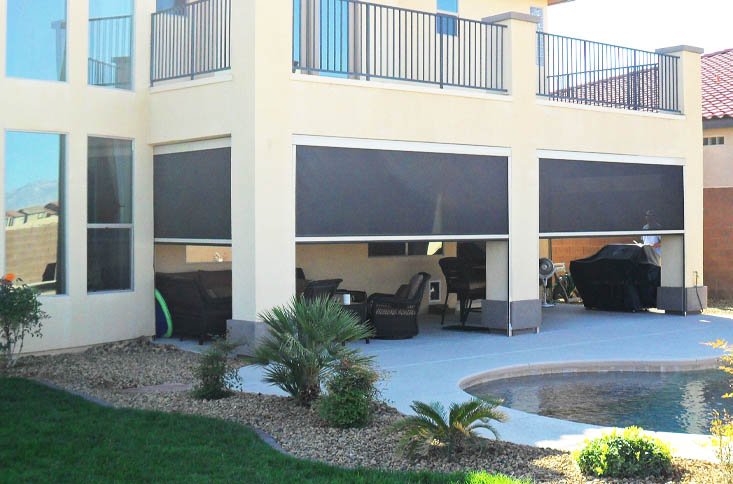
Patio shades are coverings specifically designed to provide shade and other benefits for outdoor living spaces like patios, decks, and balconies. They come in various forms, each offering unique advantages and considerations:
WOOD SHUTTERS

Wood shutters are panels attached to a frame that can be opened and closed over windows or doors. They are a classic and versatile window treatment that can add beauty, security, and insulation to your home.
Benefits of wood shutters:
- Beauty and style: Wood shutters add a timeless elegance to any home. They come in a variety of styles, including raised panel, louvered, and plantation shutters, to complement any architectural style.
- Durability: Wood shutters are made from long-lasting materials that can withstand the elements for many years.
- Security: Wood shutters can help to deter burglars and protect your windows from damage.
- Insulation: Wood shutters can help to insulate your home, keeping it cooler in the summer and warmer in the winter.
- Light control: You can adjust the amount of light that enters your home by opening or closing the louvers on louvered shutters, or by tilting the panels on raised panel shutters.
- Privacy: Wood shutters can provide privacy from outside views.
DRAPERIES

Draperies are flowing fabric panels used for a variety of purposes, most commonly seen as window treatments . They can also be used for decorative purposes around doorways or to section off areas of a room.
Draperies are typically made from heavier fabrics than curtains, such as velvet, damask, or silk. This gives them a more formal and luxurious look. They are also longer than curtains, often reaching all the way to the floor and sometimes even puddling on the ground.
There are several benefits to using draperies in your home:
- Light control: Draperies can block out light completely, making them a good choice for bedrooms or media rooms.
- Privacy: Draperies provide privacy from outside views.
- Insulation: Draperies can help to insulate your home, keeping it cooler in the summer and warmer in the winter.
- Noise reduction: Draperies can help to reduce noise from outside.
- Style: Draperies can add a touch of elegance and sophistication to any room.
PLANTATION SHUTTERS
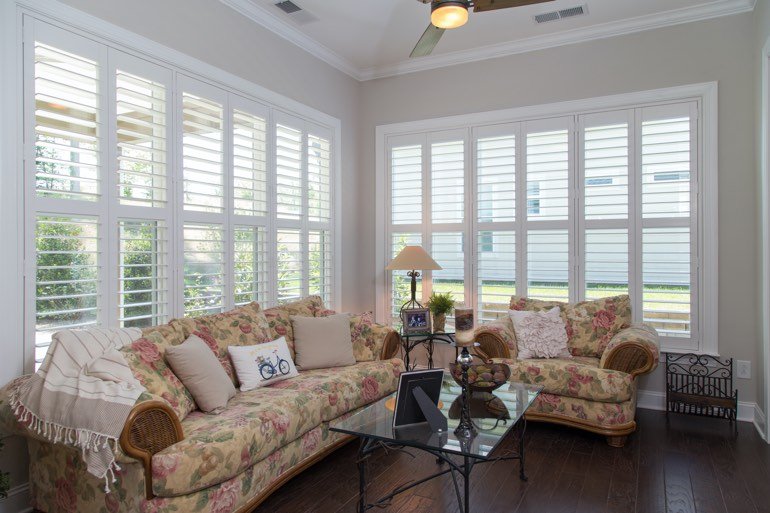
Plantation shutters are interior window coverings made up of horizontal slats, also called louvers, that can be tilted to control the amount of light, privacy, and airflow entering a room. They are similar to blinds but are typically made of wood and are mounted directly to the window frame rather than hanging from a headrail.
Here are some of the benefits of plantation shutters:
- Light control: You can adjust the louvers to allow in as much or as little light as you desire.
- Privacy: When closed, plantation shutters provide complete privacy.
- Insulation: They can help to insulate your home, keeping it cooler in the summer and warmer in the winter.
- Noise reduction: They can also help to reduce noise from outside.
- Durability: Plantation shutters are made from high-quality materials and can last for many years.
- Aesthetics: They can add a classic and elegant look to any room.
CURTAINS
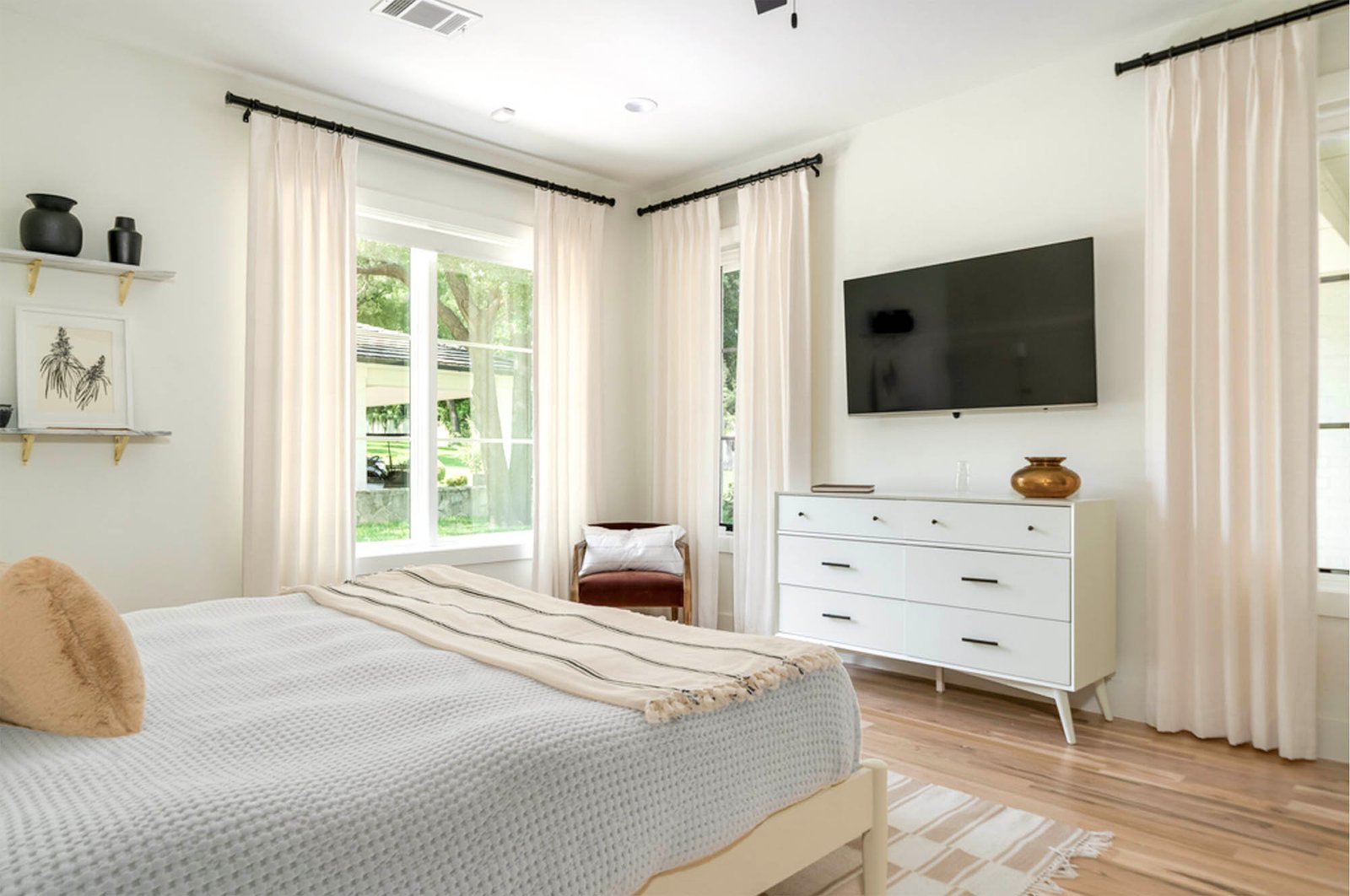
Curtains are a type of soft window treatment made from fabric panels that hang from a rod or track. They are a popular choice for windows because they offer a variety of benefits:
- Light control: Curtains can be used to block out light completely, diffuse harsh sunlight, or provide a gentle filtering effect, depending on the fabric thickness and weave.
- Privacy: Curtains provide privacy by obscuring the view into the room.
- Insulation: Thicker curtains can help insulate your home, keeping it cooler in the summer and warmer in the winter.
- Noise reduction: Curtains can also help to reduce noise from outside.
- Style and aesthetics: Curtains come in a vast array of colors, patterns, textures, and lengths, allowing you to add a decorative touch to your room and match your overall design style.
COMMERCIAL

Commercial shades are window treatments specifically designed for use in non-residential settings like offices, schools, hospitals, and retail spaces. They offer a variety of benefits compared to their residential counterparts, catering to the unique needs and demands of commercial environments.
Key characteristics of commercial shades:
- Durability: Made from high-quality materials like fire-resistant fabrics, vinyl, or aluminum to withstand frequent use and ensure long-lasting performance in high-traffic areas.
- Functionality: Often designed with features like motorized operation, centralized control systems, and specialized tracks for ease of use and efficient management of large windows or multiple shades.
- Light control: Offer various levels of light control, from glare reduction and privacy to blackout capabilities, to optimize lighting conditions for different tasks and purposes within the space.
- Energy efficiency: Some commercial shades, like solar shades, can help regulate indoor temperature by blocking UV rays and heat gain, potentially contributing to lower energy costs.
- Safety: Often comply with specific safety regulations regarding fire resistance and child safety, depending on the application and local building codes.
- Aesthetics: Available in a range of styles and colors to complement the interior design and create a professional and visually appealing environment.